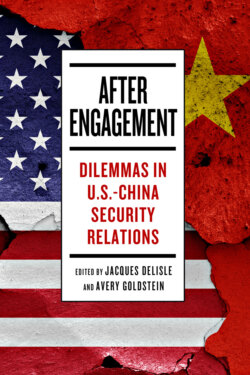Читать книгу After Engagement - Группа авторов - Страница 12
На сайте Литреса книга снята с продажи.
DOMESTIC POLITICS AND BILATERAL DISCORD
ОглавлениеIn both the United States and the PRC, domestic politics—which often had been a source of stability and optimism in bilateral relations—have contributed to the deepening rivalry in recent years. Constituencies in the United States that had favored engagement (and, in some cases, expected it to spur political liberalization in China) and constituencies in China that favored international openness and integration lost clout or questioned their prior beliefs.
In the United States, competitive elections create incentives for campaigns to disagree about foreign policy. Consequently, criticism of the party in power and its candidates for being too soft on China had been a recurring trope in US electoral politics for decades. By the mid-2010s, however, growing concern about China’s capabilities and goals was increasing the pressure, especially on incumbents, to defend their approaches to dealing with the challenge China seemed to pose to American prosperity and security.
In 2016, candidate Trump promised a much tougher stance. Although such hawkish campaign rhetoric was not unusual, it typically had given way to moderation after a new president came to power. In contrast, the Trump administration adopted policies that adhered to the candidate’s rejection of the view that the decades-long approach to relations with China had benefitted the United States. Trump derided the China policy of his Democrat and Republican predecessors, insisting that they had allowed China to take advantage of the United States. A harder-line posture garnered striking bipartisan support in Congress. As the 2020 election approached, and in the midst of a heated debate about assigning blame for the US’s failures in meeting the challenge of the COVID-19 pandemic, the center of gravity in the politics of US China policy moved further in the direction of confrontation.55
In China, too, domestic political factors have led to a tougher approach to relations with the United States. In China’s authoritarian system, the key driver has been the CCP’s concern about its legitimacy. Popular support and political stability greatly depend on the regime successfully delivering on its promises to improve the quality of life for the Chinese people and to stand up for China’s interests on the world stage. The Xi-era leadership’s emphasis on themes of national strength and China’s pride as a great power have provided room for, and have nurtured, nationalist popular opinion that constrains the regime to avoid perceptions that it is capitulating to Washington. Thus, when US policies impose costs on China that jeopardize continued growth or challenge China’s self-defined core security interests, China’s leaders have powerful incentives to avoid even the appearance of weakness in the face of American pressure. The regime can and does compromise when it seems necessary or prudent to do so.56 But meeting toughness with toughness is the more likely response when the leadership thinks it faces political damage at home for acceding to seemingly humiliating or overreaching US demands.
The politics of COVID-19 in China fit this pattern and have sharpened US-China rivalry. Concern about the public’s perception of the regime’s response to the outbreak of the disease in late 2019 predictably led Chinese authorities to squelch domestic critics and whistleblowers. But the regime also moved to stoke and sate Chinese nationalist sentiment by responding to charges from the US that the CCP’s mismanagement at home and recalcitrance abroad had contributed to the global pandemic, or, more provocatively, that the novel coronavirus was released from a Wuhan laboratory or was the product of Chinese bioweapons research. Chinese sources leveled countercharges about American mismanagement of the pandemic response and, shockingly, accusations that US soldiers might have spread the virus in summer 2019 while participating in sporting events in China.57 These and other claims from Beijing and Washington amplified the impact of domestic politics in the downward spiral of US-China relations during 2020.
Domestic politics also shaped China’s stern rebuff of Washington’s demands for change in Chinese economic policies, its dire warnings about the consequences of congressional and Trump administration moves to upgrade US relations with Taiwan, and its sharp criticism of US operations challenging China’s claims in the South China Sea. Such moves partly responded to, and reinforced, domestic political pressures—from an attentive public and from within the regime—to be firm in reacting to US policies which, in turn, fosters more adversarial relations.
